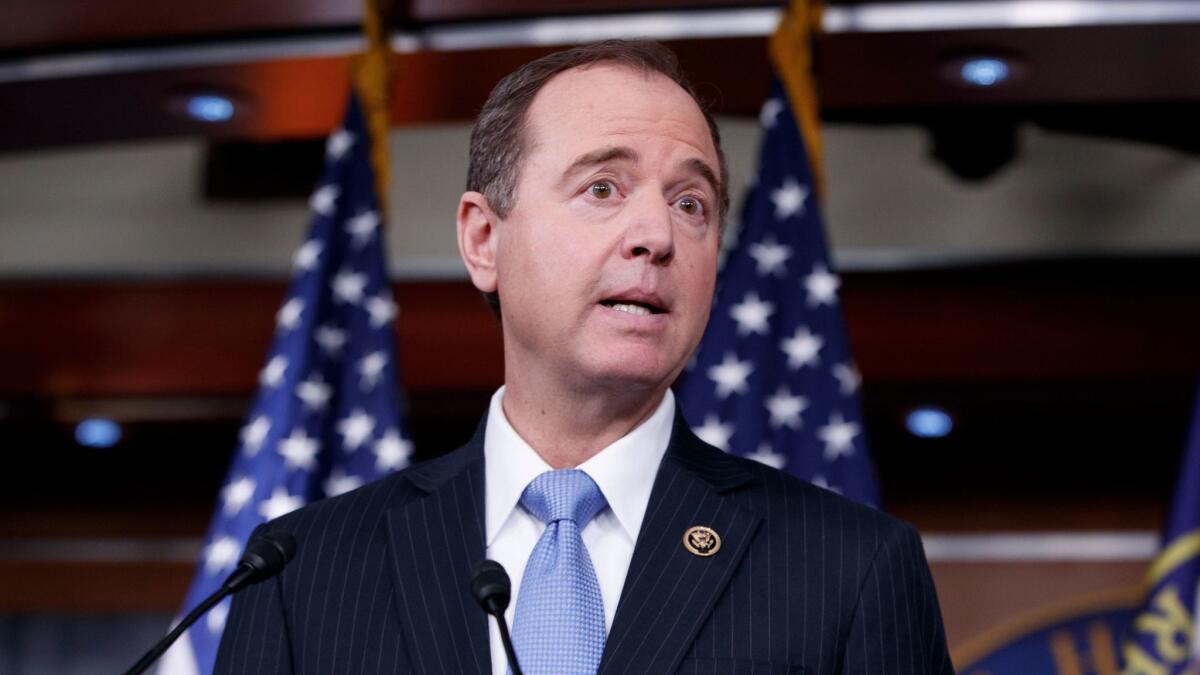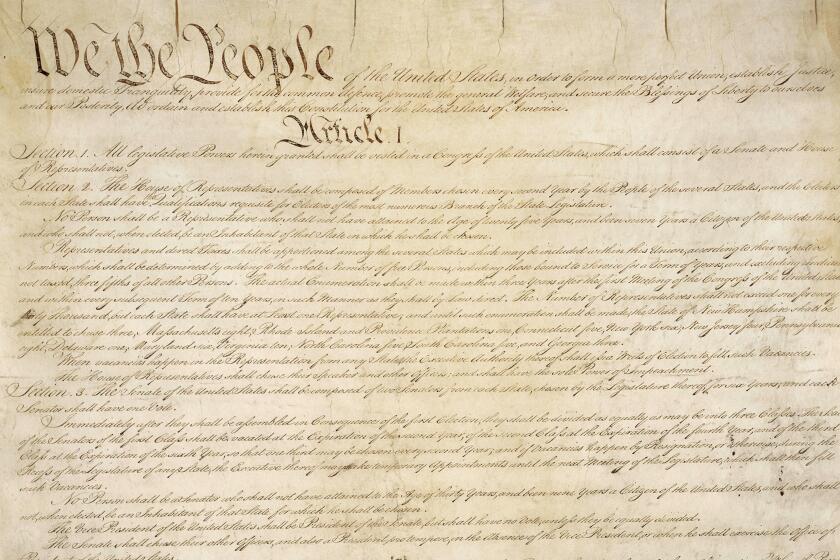Column: Patt Morrison asks: What the ranking member of the intelligence committee has to say about Russia’s role in the election

He occupies a piece of political ground that’s become high profile even on Capitol Hill — in spite of the fact that he’s a Democrat, in the party out of power. Congressman Adam B. Schiff is one of the two Californians who sits atop what’s become one of the most scrutinized committees in Congress — the House intelligence committee. The chairman is Republican Devin Nunes, of Tulare; Schiff, of Burbank, is the committee’s top Democrat. It falls to their committee, as it does to its Senate counterpart, to investigate Russia’s meddling in the 2016 presidential election. Schiff analyzes the task before his committee, and questions how President Donald Trump’s credibility and ability are challenging bipartisanship, Congress and the nation.
CLICK HERE TO LISTEN TO THIS INTERVIEW ON THE ‘PATT MORRISON ASKS’ PODCAST »
Is it too soon to talk, as some people have, about a constitutional crisis?
It probably is too soon to talk about that. Certainly if there was an administration that was ever likely to get into a problem of that order of magnitude, you’d have to say this one, given all the problems they’ve had in just a matter of a few weeks they’ve been in office. But yes, I would hope it’s too early to talk about that.
As the ranking member of the intelligence committee, you’re dealing with questions as regards Russian interference in the election and any relationship the Trump campaign may have had with Russia. And you’ve suggested a 9/11 style commission to look into all of this. What would that do?
First, it would take the investigation completely out of the political realm. Like the 9/11 commission, you would have people who are truly independent of political process. And most important, when they were done with their work, it would be something that would be broadly accepted by now a deeply divided country. As it is, we have two intelligence committees doing the work, one House, one Senate, so we want to make sure that conclusions that the committees reached are supported by the evidence.
But there are other issues that we’re also investigating. There is of course the very serious set of allegations that there were US persons colluding with the Russians, allegations that there may be Trump people who colluded with the Russians. Those are among the most serious issues we’re looking at.
We also want to look at the U.S. government response. Once we learned of what the Russians were doing, what was the U.S. government action in response to that? Was it vigorous enough? How can we learn from this? How do we prevent this from happening again? All of those questions and more are what we’re looking at.
We know the Russians did this, and that much is very clear. It wasn’t China, it wasn’t some 400-pound fat guy. We know that this was the Russians, but we should keep an open mind about whether U.S. persons were involved.
Are your Republican colleagues on board with you to do that?
You know, it is a bipartisan investigation. The chair and I have agreed to a very detailed multipage scope of investigation which includes allegations of potential collusion between the Trump campaign and the Kremlin.
It also includes an issue of leaks, which a lot of my Republican colleagues are very intent to investigate, so it is bipartisan. We may run into obstacles. They may be political in nature. We may not get the approval we need from the majority to issue the subpoenas that really should go out.
If we get to that point, I’ll be very public about it, and I’ll tell people that I don’t think this is a credible investigation. But I want to make every effort I can to do this in a nonpartisan way, because the only way we’re really going to add value is if somehow we’re able to do this together and we can arrive at a common conclusion.
But here’s the important point in terms of the committee: We’re not going to have a situation where the chair and I agree on many things, or there certainly will be frequent disagreement; you’ve heard some of them. But at the same time, if there’s a chance of us being able to do this together, that is really where the national interest lies.
Until there is a formation of an independent commission, we are the only games in town, these two intelligence committee investigations. It’s a heavy responsibility. I would frankly like to see us doing this jointly with the Senate. After 9/11, the House and Senate intelligence committees did a joint investigation that accompanied the 9/11 commission.
But in any event, it won’t have much value if we’re not able to do this jointly
What did you think when you heard President Trump accuse President Obama of wiretapping him during the campaign?
Well, I didn’t think I could be shocked any more by what the president says but I have to say, this took my breath away. It had elements of fantasy, elements of paranoia. When you couple it with another tweet he sent out at the same time about Arnold Schwarzenegger’s bad ratings, it also had just a flavor of, Is this person living in the real world? Who does that? I mean, who makes that kind of accusation? And certainly not a president of the United States.
The problem with all of this, of course, is the crises we’ve had over the last five or six weeks of this presidency have been all internally created. But we’re going to have a real crisis at some point during his term, and it will be an external crisis. It may come from North Korea or Iran, and we need to have a president who has some credibility, not only with the American people but with the rest of the world.
And when he says things like this, he loses more and more credibility that he will simply never get back. And that’s a real problem for the United States, for our security, for our place in the world.
And from a constitutional point of view, someone who doesn’t respect the judicial branch, who thinks the press are the “enemy of the people, “who will accuse his predecessor of gross illegality -- from a constitutional system he also seems to be a president who doesn’t know right from wrong.
As a federal prosecutor, in 1990 you won a conviction of an FBI agent who passed secret documents to the Soviet Union. In 2012, GOP presidential candidate Mitt Romney said Russia was our chief geopolitical foe. What’s happened to change our longstanding position that Russia is a rival and a danger?
I think Presidents Obama really put his finger on this a couple of months ago, when he talked about how ironic it was that the party of Ronald Reagan was coming to embrace the Kremlin and was willing to accept Russian intervention in our election because it helped them and it hurt the Democrats, that our partisanship had gotten that extreme, where that kind of foreign intervention was, if not welcome, it was at least accepted.
I have to think that Mitt Romney or John McCain, when they were running for president, if the Russians had done this, they would have had the character and stature to say, Russians, butt out.
Your California Republican colleague Devin Nunes was asked about Donald Trump’s claim that the Obama administration had wiretapped him, and he said, the president just lacks experience in politics. The larger argument has been, he’s new to this governance business, just give him a break.
Maybe you could say that, but you can’t normalize this kind of behavior, and it’s one thing to make a minor misstep. It’s another thing to accuse your predecessor of gross illegality and do so without any basis whatsoever. And I think we have to acknowledge that this is not going to change. This is going to be who he is. And it cannot mean that we accept this as now, Okay, that’s just the president being the president. It’s not okay.
Obviously there are other things on your to-do list than just this. Foremost among them now may be the healthcare changes.
It’s always been clear over the years, as the GOP touted repeal and replace, that they had no replacement in mind. There are individual Republicans who have individual ideas; some just want to repeal it and leave it at that. Others wanted to enact some kind of tax cuts. But we’re seeing it now quite graphically how little of a plan they have.
What they released is breathtaking in certain respects. It has tax cuts in it for very wealthy people, which is kind of striking in health care reform. It also provides an incentive to increase the pay of insurance company executives by increasing the amount which can be tax deductible, so it’s using tax dollars to support the increases in executive salaries for insurance company personnel. And it’s also cutting Medicaid, meaning that millions of people are going to lose their health insurance. And even then, it doesn’t have enough Republican support to pass.
When you see the president express surprise that, gosh, this is actually kind of complicated, you wonder, what did they think it was?
The president, I remember, as a candidate, said he was going to promise better health care at cheaper prices, and he was really good at this so we could believe him. Well, now we see that his being really good at this means, Okay, Congress, come up with something and I’ll sign off on it.
What they’ve come up with is getting almost uniformly bad reviews – bad reviews from conservatives like the Heritage Foundation, bad reviews from the AARP, bad reviews from the AMA.
What we’re going to have to do is what we have been, which is expose the flaws of this. How much will their premiums go up? And how many millions of people will lose their health insurance? We’re not going to become complicit in helping the Republicans disenfranchise people from their health care.
We’ve heard proposals to cut the National Oceanic and Atmospheric Administration, to cut the Department of the Interior — so many things happening in what will be the forthcoming budget. What are Democrats’ plans to deal with these?
One of the challenges we have is being able to prioritize and focus and say, OK, which fights are we going to attach the greatest urgency and priority to? The concerns over violations of the Emoluments Clause, with the effort to defund Planned Parenthood in the Affordable Care Act replacement, to the cuts of over a third of the State Department, and there are innumerable problems with what this administration is trying to do and what the majority is complicit in. Our challenge in the minority is being able to highlight the most egregious, being able to spotlight where there are the biggest ethical and constitutional problems, and trying to put some guard rails around this administration and this majority.
We’re at a singular time in history where we’re finding out just how fragile our democracy is. You grow up as I have in the latter part of the 20th century and you believe that everything is quite solid and we have this brilliantly written constitution. And all of a sudden you realize the constitution is extraordinarily written, but it’s not self-executing. And there are certain norms of behavior that have guided us and made that democracy work. Those norms are being thrown out on a daily basis; it’s really quite fragile.
I think the reason we are where we are today and have this president is there were enough people around the country who looked at all the candidates for president, all the Democrats and all the Republicans, and concluded, They’re all basically the same. I I don’t believe any of them are going to do anything different. There’s only one guy that looks different, and that’s Donald Trump. I am so much at my wit’s end that I am willing to roll the dice on this guy.
And it was a heck of a roll of the dice, and I understand why people decided they were willing to take that risk. Unfortunately now we’re seeing the downside of taking a risk like that.
So that underlying problem that nobody seemed to be speaking to a large part of the country with sufficient resonance that they thought there would be real changes to their lives — that has to be addressed. That worry is still out there. That lack of faith in governance is still out there. So there’s a lot of confidence-building measures we have to undertake across our society.
I think for my party, we made a mistake of really not trying to talk to people in large parts of the country. And I certainly hope that’s corrected, because I think not only for the success of my party, but to get our democracy back on track, we are going to have to address those fundamental concerns.
Follow the Opinion section on Twitter @latimesopinion or Facebook
More to Read
A cure for the common opinion
Get thought-provoking perspectives with our weekly newsletter.
You may occasionally receive promotional content from the Los Angeles Times.







